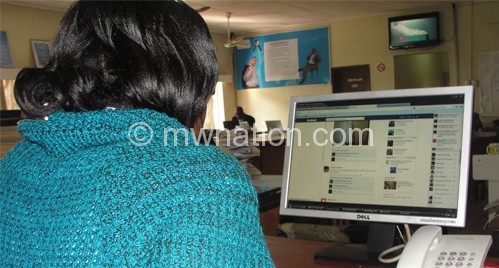Is online dating reliable?

Society and culture continue to be quickly influenced by technological advances. Trends in today’s world would have been unthinkable 30 years ago, and most of this transformation has been championed by easy connectivity brought by communication gadgets such as cell phones and computers.
Dating is one of the areas which have witnessed behavioral change attributed to this technological shift. The deployment of the Internet has completely altered the way some people find love. Indisputably, this has tendered both positives and negatives.
Billy Kanyama, an accountant based in Lilongwe, thinks online dating has brought down barriers that used to deter potential lovers from meeting each other.
“You don’t have to go out to the taverns or entertainment places unless you really want to. But by using online dating services and going through profiles, you can get to know your man or woman, sample their photos, hear their voice and make knowledgeable judgment. To have this information is far better than meeting someone in any other casual spot because this gives you a good insight of what you are really getting into,” he says.
Kanyama adds that social networks offer a lot of options for people to choose from.
“Using online dating forums, one has an excess of prospects and a wide range of choices when it comes to finding a partner. Potential lovers used to be hard to come by and chances were always slender that you would triumph. Having a diversity of choices is a fantastic revolution,” he says.
He further argues that the networks help to get rid of first date nerves which are a normal, but sometimes embarrassing.
“Nervousness might still be there, but after getting to know a person online or talking to them on the phone, your first meeting should be a foregone occasion. There would be no need of drinking to get rid of nerves. With this service you can be very specific about what you need and with the screening process you wouldn’t be guessing. If still in doubt, you can obviously clear it up,” he says.
Pastor Grivins Machika of Mzimba argues that although the scriptures do not prohibit online dating; his view is that it encourages the concept of buying love.
“In these forums, there is this thing called the marketplace—where people go to shop for possible romantic partners and to sell themselves hoping to create a successful romantic relationship. To me, this is buying love which is quite inappropriate and God made love for free,” he says.
Machika adds that internet dating promotes promiscuity among both the married and unmarried.
“Married people hunting for relationships pose as singles on these sites. It is also an open secret that dating sites are encouraging short term sexual relations,” he says.
Machika further states that online dating brings people into conflict with God as they start doubting his goodness and omnipotence.
“A common motive that drives people into this is desperation and loss of hope in God in providing you a partner. If this is your drive, then you better ask forgiveness of incredulity and begin to trust in His supreme capability. Jeremia 17:9, James 1:14 and Luke 6:43-45 would be helpful to people who are in these situations,” he says.
Australian-based social psychologist, Wellington Master, says one of the biggest downsides of the internet is that it is an easy platform to cheat and exploit others and, thus rendering it not too viable as an option for finding new relationships.
“People, especially women looking for love on the internet are exposing themselves to fraud and sexual violence. These sites are also good hunting grounds for internet fraudsters. My advice is that you should never reveal anything financial about yourself and most certainly never offer to help someone out with money,” he says.
He then states that studies done across Southern Africa point to the fact that a good percentage of partners who meet online do not celebrate their third anniversary together.
“A 2011 research by Chester and MacBrowne, for instance, found that of all the relationships studied, 29 percent of the couples were still together at the time of the study, and of these 16 percent of the couples had been together for at least 12 months, and 6 percent for at least 24 months. Of the affairs which had broken, 9 percent had lasted for over a year, and only 3.1 percent had lasted for 24 months,” he says.
Phiri said the break ups were attributed to the fact that in the past, race mattered most unlike in contemporary society which “is becoming more post-racial.”
“This is the reason most people find dating sites welcome. But interestingly, what we should all know is that there is very little attachment between what we say and what we do. People can claim to be colour blind, but when it comes to dating our cultural identity or race will matter most,” he adds.
He states that couples who exchange presents ahead of getting together form stronger, devoted and meaningful relationships as synchronised communication structures deepen intimacy.






too reliable for that matter those that shy @ first sight hv the chance?